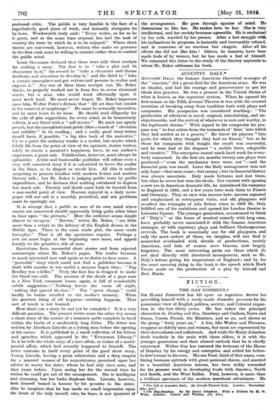AUGUSTIN DALY.*
ALIOUSTLN DALY, the famous American theatrical manager of the " nineties," did a great deal for the American stage. He was an idealist, and had the courage and perseverance to put his ideals into practice. He was a pioneer in the United States of what is known as the repertory system. When he opened his first season at the Fifth Avenue Theatre it was with the avowed intention of breaking away from tradition both with plays and companies. His prospectus was considered startling " The production of whatever is novel, original, entertaining, and un- objectionable, and the revival of whatever is rare and worthy, in the legitimate drama." With regard to his companies his pur- pose was " to free actors from the trammels of lines ' into which they had settled as in a groove." He threw his players "into parts for which they thought they had no fitness," but as he chose his companies with insight the result was successful, and he soon had at his disposal " a mobile force, adaptable and creative." The enterprise meant much hard work for every- body concerned. In the first six months twenty-one plays were produced—" even the mechanics were worn out "—and the financial gain was small. Later the Daly management won not only fame—that soon came--but money ; but its financial history was always uncertain. Daly made fortunes and lost them, but what he never lost were his ideals. Not content with opening anew era in American dramatic life, he introduced his company to England in 1884, and a few years later took them to France and Germany. They at once won success here, success repeated and emphasized in subsequent visits, and old playgoers will recollect the triumphs of Ada Behan when in 1893 Mr. Daly fulfilled one of his ambitions and opened his London theatre in Leicester Square. The younger generation, accustomed to think of " Daly's " as the home of musical comedy with long runs, have probably never associated it with the famous American manager, or with repertory plays and brilliant Shakespearean revivals. The book is essentially one for old playgoers, and only the most ardent of these, we imagine, will not find it somewhat overloaded with details of productions, mainly American, and lists of names once famous, now largely forgotten. The moat interesting parte are those which do not deal directly with theatrical management, such as Mr. Daly's letters giving his impressions of England ; and by far the most amusing thing in the book is the speech which Mark Twain made on the production of a play by himself and Bret Harts.


































 Previous page
Previous page